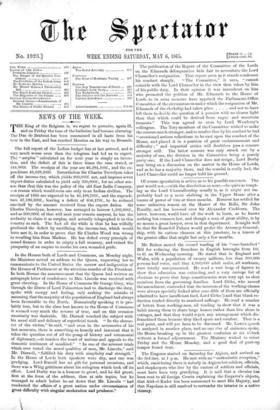In the Houses both of Lords and Commons, on Monday
night, the Ministers moved an address to the Queen, requesting her to communicate to the United States the sorrow and indignation of the Houses of Parliament at the atrocious murder of the President. In both Houses the announcement that the Queen had written an autograph letter of condolence to Mrs. Lincoln was received with great cheering. In the House of Commons Sir George Grey, who through the illness of Lord Palmerston had to discharge the duty, spoke with energy and feeling, only making the mistake of assuming that the majority of the population of England had always been favourable to the North. Numerically speaking it is pro- bably true, but to the class best known to the House of Commons it seemed very much the reverse of true, and on this occasion unanimity was desirable. Mr. Disraeli touched the subject with his usual skill and delicacy of superficial touch. "In the charac- ter of the victim," he said, "and even in the accessories of his last moments, there is something so homely and innocent that it takes the question out of all the pomp of history and ceremonial of diplomacy,—it touches the heart of nations and appeals to the domestic sentiment of mankind." "In one of the severest trials which ever tested the moral qualities of man, Mr. Lincoln," said Mr. Disraeli, "fulfilled his duty with simplicity awl strength." In the House of Lords both speakers were dry, and one was grudging. Lord Russell has no gift for personal occasions, and there was a Whig grittiness about his eulogium which took off its effect. Lord Derby was in a humour to growl, and he did growl, first at the form of the address, then at side topics, but he managed to admit before he sat down that Mr. Lincoln "had conducted the affairs of a great nation under circumstances of great difficulty with singular moderation and prudence."






























